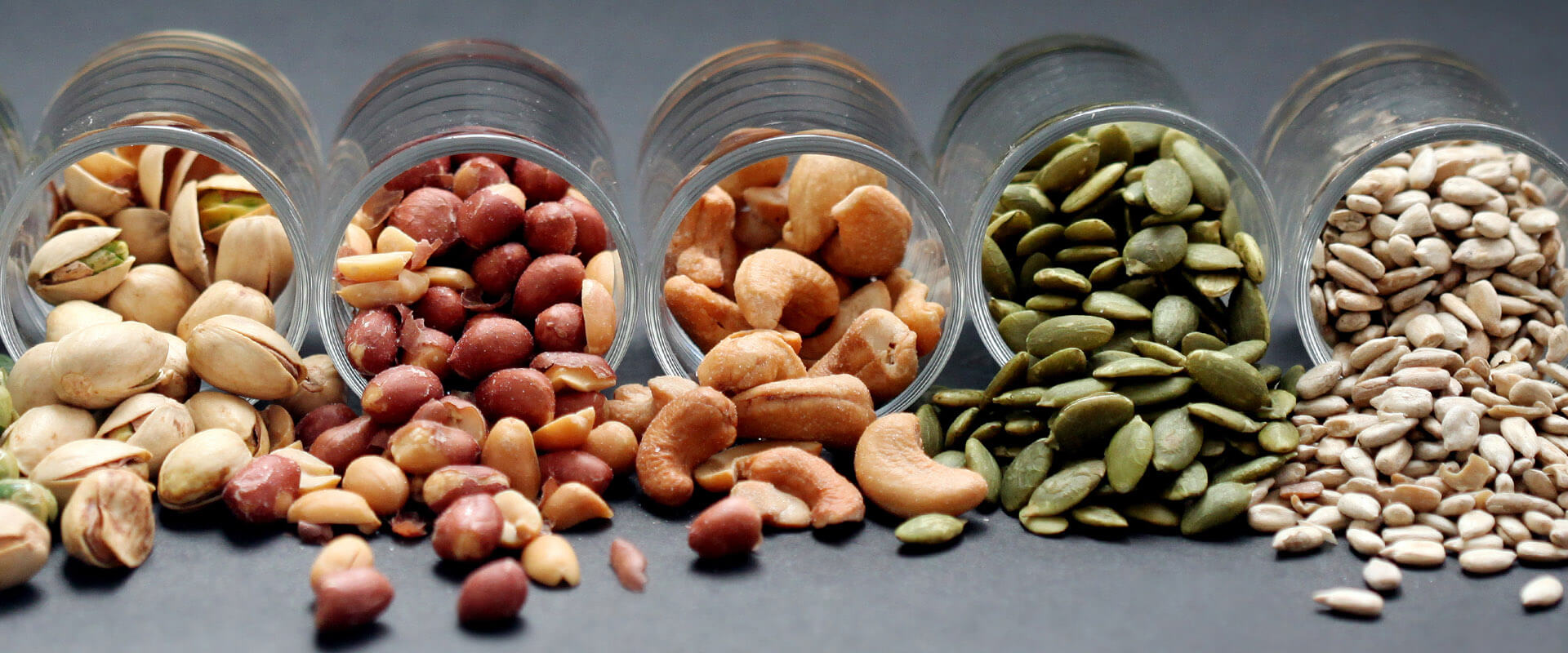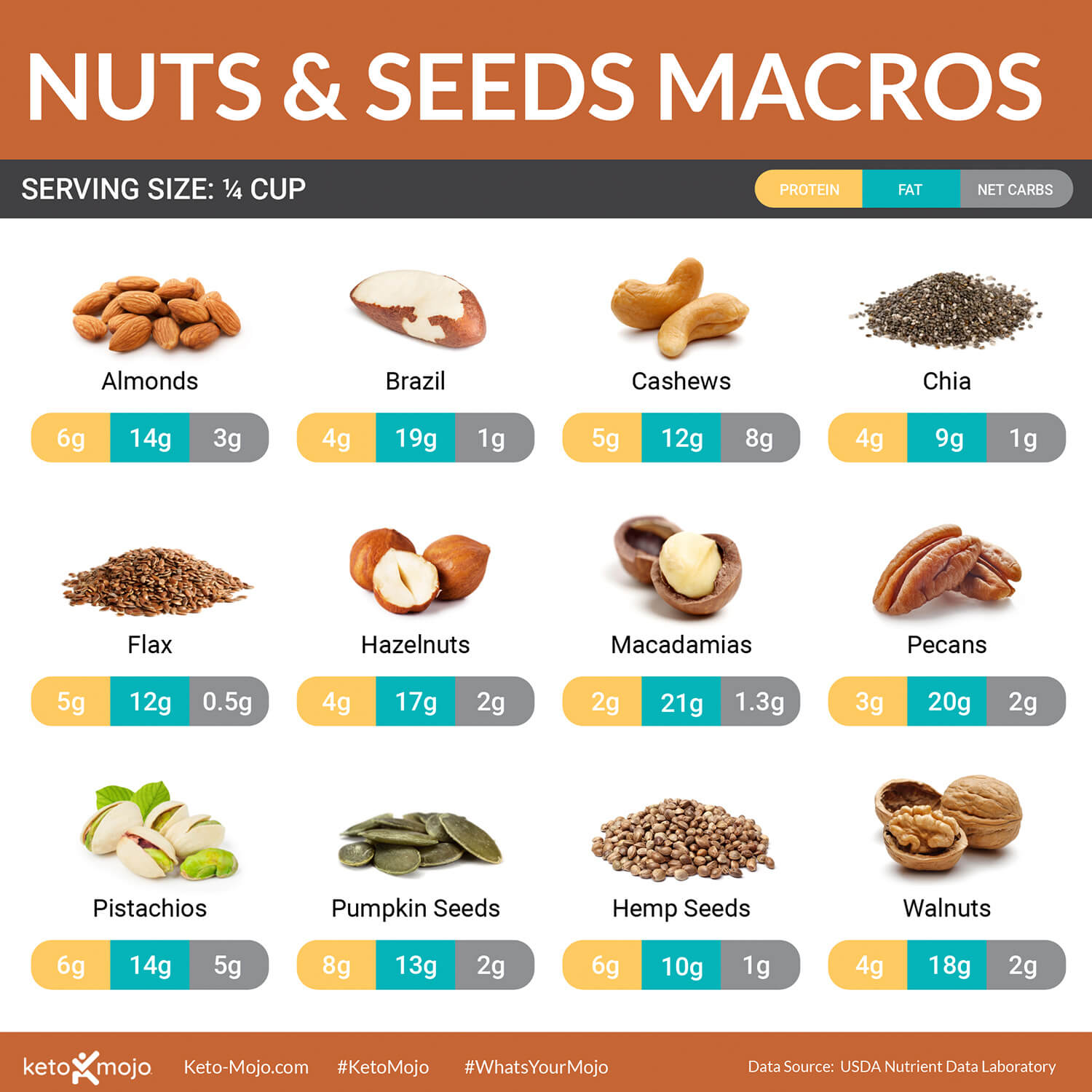There’s a reason animals know to rely on nuts and seeds for sustenance. They’re veritable mini health bombs, literally loaded with vitamins, minerals, fiber, and healthy fats that support the health of every cell in your body. Want more specifics? Consider this: Nutrients regularly abounding in nuts and seeds include monounsaturated fats (omega-9), polyunsaturated fats (omega-3 and omega-6), fat-soluble vitamins (vitamin E and vitamin K), dietary fiber (both soluble and insoluble), B vitamins (folate, thiamine), important minerals (copper, potassium, magnesium, selenium), and antioxidant compounds (polyphenols).
And there’s more. Research shows that consuming nuts and seeds can help prevent a range of diseases, including heart disease, diabetes, cancer, and hypertension. Additionally, markers of chronic diseases like oxidative stress and inflammation are shown to improve when nuts and seeds are incorporated into the diet. Finally, despite their high-calorie count, nuts support weight loss and maintenance, in part, by increasing satiety.
But what about nuts and seeds for keto? Are all nuts and seeds equally recommended if you’re following a ketogenic lifestyle? Simply put, the answer is no. Some nuts and seeds are better than others. Read on to learn which ones to choose, and keep in mind that if transitioning to a keto diet, you may want to wait to introduce nuts and seeds until you’ve settled in, since it can be easy to overindulge and blow your daily macros. This is less the case once you’re used to the keto diet and carb-induced cravings have subsided.
Nuts and Seeds and Macros, Oh My!
If you’re looking at nuts and seeds from a macros perspective, you’ll notice they tend to be high in fat, contain moderate protein and carbohydrates, and include a healthy dose of fiber, the latter of which helps lower the net carb count and makes most nuts and seeds very keto-friendly. (Read all about calculating macros and net carbs here.)
However, some nuts and seeds have higher carbohydrates than others (Hello, cashews and sesame seeds!), so it’s good to know which ones to focus on and which to enjoy in moderation.
Top 10 Keto-Friendly Nuts and Seeds
Following is our list of the top 10 keto-friendly nuts and seeds based on net carbs per serving. Nutritional information source: USDA Department of Agriculture.
#1 Flax Seeds
At 6 grams of total carbs per two-tablespoon serving, flaxseeds may appear to be high in carbs, but most of those carbs come from fiber, which you can subtract from your total carb count to get your “net” carbs. In fact, the fiber content in flaxseed is one of its most well-known health benefits.
What’s more, flaxseeds contain both soluble and insoluble fiber, making them an excellent choice for improving digestive health, and research suggests they may also improve metabolic health.
Make sure to grind your flaxseed or purchase ground flaxseed so that you can get all of its benefits (Whole flaxseeds will pass through your body, undigested). You can add flax to your keto shake or smoothie, or even use it to replace eggs in your baked goods. Or try it in our fantastic Crispy Keto Breakfast Cereal or Slicing Bread.
#2 Hemp Seeds
Hemp seeds are packed with omega-3 fatty acids, which play a crucial role in the health of your brain, heart, and eyes. They’re also a rich source of a variety of minerals, including potassium, magnesium, sulfur, calcium, iron, and zinc.
Hemp seeds make a great topping to salads and can also be added into protein shakes for a little nutty flavor. Hemp is also a tasty ingredient in our Crispy Keto Breakfast Cereal.
#3 Shelled Pumpkin Seeds
If you’re looking for a protein boost, pumpkin seeds are the number-one pick. With nine grams per ¼ cup serving, these seeds make an excellent midday snack to keep you going. Pumpkin seeds are also a great source of zinc, an essential mineral that’s involved in immunity, protein synthesis, wound healing, and growth and development.
Enjoy pumpkin seeds – raw or toasted and seasoned – as a midday snack, or throw them into your salads or keto-friendly baked goods. They’re also great in our Keto Seeded Crackers recipe.
#4 Pecans
In the search for low-carb nuts, pecans are a great option with only 2 net carbs per serving.
While nuts, in general, are known for their positive effect on heart health, research shows that a pecan-rich diet, in particular, may lead to a reduced risk of both cardiovascular disease and diabetes.
Traditionally, pecans are often found in desserts (try our Keto Maple Pecan Pie), but they’re fantastic as a toasted snack or topping for salads and can be chopped fine and used as “breading” for chicken or pork as in our Keto Pecan-Crusted Chicken with Mustard Cream Sause and Asparagus recipe.
#5 Brazil Nuts
Brazil nuts are an excellent source of selenium, which plays a critical role in thyroid health, reproduction, DNA synthesis, and protection against oxidative stress, cardiovascular disease, and cancer. Just one nut contains over 100 percent of the recommended daily intake for this crucial mineral! Since your body can’t make selenium on its own, it’s vital that you get it through diet. However, it’s important not to go overboard with Brazil nuts, as eating too many of them can lead to toxic levels of selenium in your body. To be safe, limit your intake to two or three per day.
Crush up a couple of Brazil nuts and sprinkle them on your keto-friendly desserts, or enjoy them solo.
#6 Walnuts
Folk medicine says that the shape of a food can help you understand what part of your body it supports. For instance, if you look at a walnut, you might notice that it kind of looks like a brain. This tradition, known as “the doctrine of signatures,” has proven correct time and again, and interestingly, walnuts happen to contain several brain-supportive nutrients, including omega-3 fatty acids, vitamin E, antioxidants, and folate. Emerging research suggests that consuming these nuts may improve cognitive function and reduce the risk of Alzheimer’s disease and other brain disorders.
Crushed walnuts make a fantastic addition to keto-friendly brownies or muffins, or try adding them raw or toasted to a salad or smoothie for an extra boost of omega-3s. (Also try them in our keto cranberry sauce.)
#7 Macadamia Nuts
While all nuts are rich sources of fat, macadamia nuts are particularly rich in omega-9 fatty acids (aka the monounsaturated fat). As a matter of fact, around 50 percent of the fat in these creamy nuts comes from omega-9’s. This is important because omega-9 fatty acids appear to reduce levels of inflammatory chemicals and could potentially reduce cancer risk. In addition, oleic acid (the type of omega-9 found in macadamia nuts and most other nuts) has also been shown to improve heart health and protect against insulin resistance.
Macadamia nuts are an incredibly satisfying snack all on their own, but they also add delicious flavor when crushed and used as a breading or a topping for sauteed fish or chicken. For dessert, try them in our Keto Macadamia and White Chocolate Shortbread Cookie recipe.
#8 Chia Seeds
Chia seeds are an incredible source of soluble fiber. These small seeds can double (and even triple) in size when added to a liquid medium, such as water or coconut milk. As a source of soluble fiber, chia seeds can support digestion, protect against diabetes, and help to lower cholesterol levels, as well as being a rich source of antioxidants.
A little goes a long way! You can add a tablespoon or two of chia to your smoothies or bowls, or leave it overnight in coconut milk (or milk of choice) for a chia pudding.
#9 Hazelnuts
While all nuts contain antioxidant compounds, hazelnuts are particularly high in proanthocyanidins, potent antioxidants that have protective effects against oxidative stress and inflammation and play a role in immune health and DNA repair.
Hazelnuts have a naturally sweet and nutty flavor and make a perfect choice for roasting and sprinkling on top of salads or desserts. You can even find jars of hazelnut butter in some stores, although they’re typically not cheap.
#10 Almonds
Of all the nuts and seeds on this list, almonds are by far the most popular and sometimes the most cost-efficient as well.
Almonds are particularly high in vitamin E, one of the fat-soluble vitamins. Vitamin E acts as an antioxidant and protects the outer layer of your cells from damage, keeping your cells intact and healthy. In one study, men who consumed almonds as a snack for four weeks not only increased their vitamin E status but also reduced their inflammatory markers and LDL cholesterol levels.
Throw some almonds in a bag to have on hand for a snack, add them to a keto-friendly trail mix, or enjoy them in their ground-up form as almond flour for your keto baked goods (including our awesome keto chocolate-almond tart crust). You can even use almond meal as a substitute for breading or throw slivered almonds on savory casseroles to create a crunchy topping.
Higher-Carb Nuts to Enjoy in Moderation, If At All
What about the rest of the nut and seed world, you wonder? Are those off limits? Not exactly. Nuts and seeds with higher net carb counts or a high proportion of carbs compared to fat and protein are best enjoyed in moderation, or avoided altogether if you tend to be sensitive to carbs and want to eat to your daily high-fat, low-carb macros.
The following are some nuts and seeds to eat mindfully, if at all.
- Cashews: 8.5 net carbs per ¼ cup serving
- Chestnuts: 17 net carbs per ¼ cup serving
- Pistachios: 5 net carbs per ¼ cup serving
- Sesame seeds: 4 net carbs per ¼ cup serving
- Sunflower seeds 4 net carbs per ¼ cup serving
A Quick Word on Nuts and Seeds and Digestibility
Now that you know the best nuts for a keto diet, here’s something else to consider: Because nuts and seeds can be high in phytic acid, they can be challenging for some people to digest. A simple soak in water overnight can improve their digestibility. Also, people with the herpes simplex virus (HSV) and a tendency to break out often may experience heightened breakouts due to the high arginine (an amino acid) content of nuts and seeds.
The Final Word
Nuts and seeds can be a delicious and healthy part of a ketogenic diet, but some nuts and seeds are better than others. Lean on the nuts and seeds with low carb counts and high fat content to easily eat to your macros and enjoy the intrinsic health benefits of these natural, nutrition-packed foods. Also, remember, even with keto-friendly nuts and seeds, pay attention to the serving size to ensure you stay in the keto zone.




